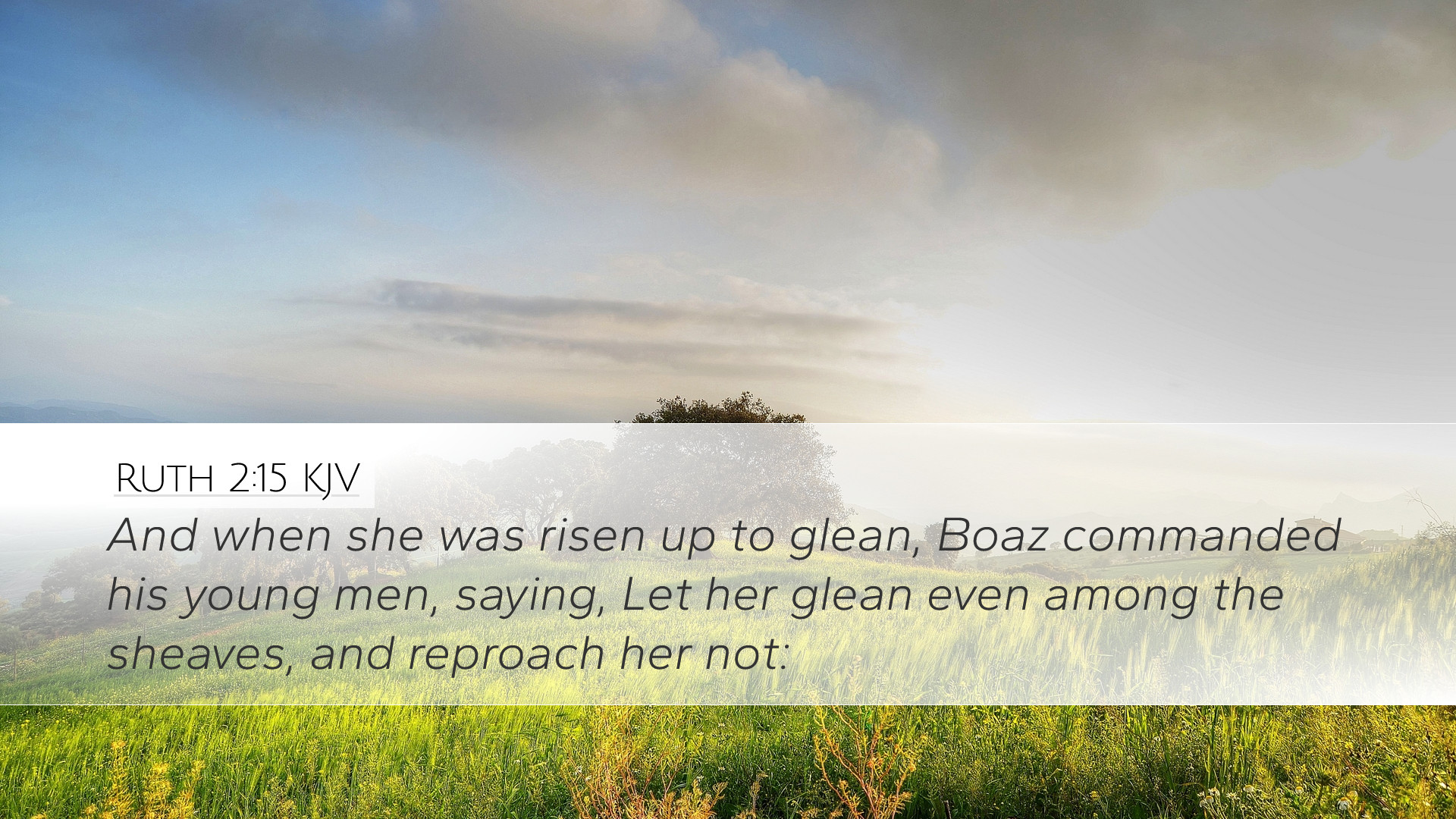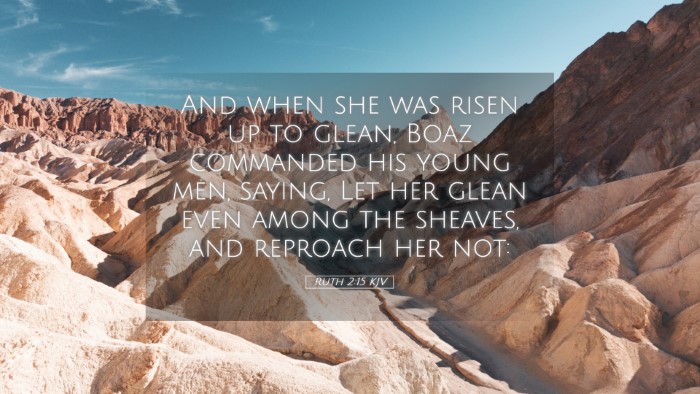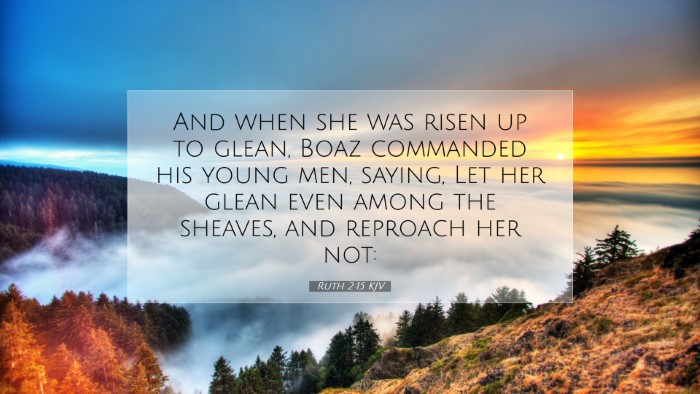Old Testament
Genesis Exodus Leviticus Numbers Deuteronomy Joshua Judges Ruth 1 Samuel 2 Samuel 1 Kings 2 Kings 1 Chronicles 2 Chronicles Ezra Nehemiah Esther Job Psalms Proverbs Ecclesiastes Song of Solomon Isaiah Jeremiah Lamentations Ezekiel Daniel Hosea Joel Amos Obadiah Jonah Micah Nahum Habakkuk Zephaniah Haggai Zechariah MalachiRuth 2:15
Ruth 2:15 KJV
And when she was risen up to glean, Boaz commanded his young men, saying, Let her glean even among the sheaves, and reproach her not:
Ruth 2:15 Bible Commentary
Commentary on Ruth 2:15
Bible Verse: Ruth 2:15 - "And when she was risen up to glean, Boaz commanded his young men, saying, 'Let her glean even among the sheaves, and reproach her not.'
Introduction
This verse captures a significant moment in the Book of Ruth, a narrative rich in themes of providence, loyalty, and redemption. Ruth’s decision to glean in the fields of Boaz symbolizes her commitment to survival and familial duty, whereas Boaz's actions reveal the broader themes of grace, protection, and social justice.
Contextual Background
The Book of Ruth is set during the period of the judges, a time marked by instability and moral ambiguity in Israel. Ruth, a Moabite widow, represents the inclusion of outsiders into God's redemptive plan. This context heightens our understanding of Boaz’s generous actions towards Ruth.
Matthew Henry’s Insights
Matthew Henry emphasizes the providential hand of God in Ruth’s gleaning. He notes that Boaz’s command to allow Ruth to glean among the sheaves illustrates divine favor. Henry points out that gleaning laws permitted the poor to gather leftovers from the harvest, but Boaz’s allowance for Ruth to collect even among the sheaves demonstrates extraordinary kindness.
- Grace in Gleaning: Henry highlights that Ruth was not just another gleaner; her status as a foreigner made her vulnerable. Boaz’s command was a clear act of grace, breaking cultural norms to protect and uplift Ruth.
- Character of Boaz: According to Henry, Boaz exemplifies a godly character. His actions reflect the heart of God towards both the poor and the foreigner, embodying the principle of loving one's neighbor.
Albert Barnes’ Commentary
Albert Barnes draws attention to the significance of Boaz’s instructions to his young men. Here, he notes that Boaz is not merely acting out of obligation but rather displays a heartfelt concern. By instructing his workers to let Ruth glean without reproach, Boaz signifies a broader theme of hospitality and acceptance.
- Gleaning as a Means of Provision: Barnes notes that for Ruth to gleam among the sheaves symbolizes a provision that goes beyond mere sustenance; it reflects God's overflowing provision in times of need.
- Social Justice: Barnes emphasizes the social implications of Boaz's command. His protection of Ruth illustrates a rejection of social barriers that may separate the affluent from the impoverished, and the Israelites from the Gentiles.
Adam Clarke’s Interpretation
Adam Clarke, too, brings to light the nature of Boaz’s commands, focusing on the phrase "reproach her not." Clarke interprets this as a reflection of Boaz’s wisdom and sensitivity. He reflects upon the fact that Ruth’s situation is precarious, and Boaz’s desire to shield her signifies a protective love.
- Poverty and Dignity: Clarke underscores the dignity afforded to Ruth through Boaz’s command. Boaz elevates her status, offering not just material aid but also affirming her worth as a person created in the image of God.
- Foreshadowing Redemption: Clarke argues that this act of kindness by Boaz is a foreshadowing of the greater redemption that comes through Christ, who would eventually embody the love of God for both Jew and Gentile.
Theological Implications
This verse and the accompanying commentary bring forth a multitude of theological implications. First is the idea of divine providence; God's hand is evident in the seemingly mundane events of life, orchestrating outcomes for His glory and the good of humanity.
Furthermore, this passage challenges readers to consider their own response to the marginalized within society. Boaz acts as a Christ-like figure, offering grace and protection. This serves as a model for how believers are to engage with those around them, demonstrating love that reflects God's heart.
Practical Applications
- Acts of Kindness: Just as Boaz went beyond the requirements of the law, Christians today are encouraged to reflect on how they can go beyond social norms to extend kindness and support to those in need.
- Embracing Diversity: Ruth’s inclusion into the community of Israel serves as an important reminder that the Gospel transcends cultural and social barriers. Believers are called to welcome all, following the example of Christ.
- Understanding Providence: In times of personal struggle or societal upheaval, one can look to Ruth 2:15 as a reminder of God’s ever-present provision and care.
Conclusion
Ruth 2:15 is not merely a historical narrative; it serves as a vital theological text that speaks on the nature of God’s grace, the dignity of the poor, and the expansive reach of divine love. The commentaries of Henry, Barnes, and Clarke collectively provide a multi-faceted understanding of this text, encouraging contemporary readers to reflect deeply on their actions and attitudes towards others, especially marginalized individuals.


